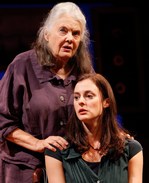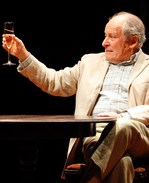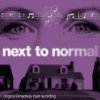SITE GUIDE
SEARCH
REVIEWS
REVIEW ARCHIVES
ADVERTISING AT CURTAINUP
FEATURES
NEWS
Etcetera and
Short Term Listings
LISTINGS
Broadway
Off-Broadway
NYC Restaurants
BOOKS and CDs
OTHER PLACES
Berkshires
London
California
New Jersey
DC
Connecticut
Philadelphia
Elsewhere
QUOTES
TKTS
PLAYWRIGHTS' ALBUMS
LETTERS TO EDITOR
FILM
LINKS
MISCELLANEOUS
Free Updates
Masthead
A CurtainUp Review
After the Revolution
By Elyse Sommer
| There's a lot we agree about. — Leo discussing how the newly published revelations about their father shuld be dealt with. We're talking about the difference between honoring dad and shitting on him.— Ben I guess the main thing we disagree about is that those are the only options—Leo Your disappointment in your family is terrible I know, but Emma, this is not an uncommon predicament. Take a walk in the East Village {in the 1940s}, throw a stone and you hit a spy.— Mort. |

Katharine Powell and Lois Smith
( Photo by Joan Marcus) |
The play has arrived with the Williamstown director, cast and creative team intact. Playwrights Horizon's Peter Sharp Theatr is approximately the same size as Williamstown's second stage, so having now seen the play for the second time, I'm happy to report that it held me as much the second time around. If anything, the actors have deepened their performances and the ending that I had some reservations about now seems just right. All this said, what follows is essentially a reprise of my original review.
To begin, a delighted hallelujah. A new play not dollar-bound to tops, 4 characters. Not one of its full-bodied ensemble double cast and not a single audience addressing monologue.
More joy because here's a playwright who isn't afraid to be a bit talky in order to create an absorbing three-generation family saga flavored with authentic historic details that may send some audience members — especially those in the much sought after under 35 demographi— on a Googling expedition.
Director Carolyn Cantor has staged the Joseph family's story on a set that shifts locations fluidly, with a single set that evokes four different apartments and a restaurant without a lot of distracting prop moving. Oh, and at the risk of repeating myself, the cast simply couldn't be better?
The fine tuning I felt the WTF production could use has been so seamless that, except for the elimination of an unnecessary waiter in a restaurant scene, I can't tell you just what is different — just that it all works. This is a wonderfully original yet old-fashioned new dramas. It's old-fashioned in that it's full of substantive talk (think George Bernard Shaw's discussion plays) without concessions to the notoriously short attention spans of modern audiences.
The time is 1999, and the past decade has seen the collapse of the Soviet Union and the death of Joe Joseph, the family's paterfamilias (a bit of naming wordplay on Soviet Union dictator Joseph Stalin?). He has passed on the family commitment to Left politcs to sons Robbie (Peter Friedman) and Mel (Mark Blum) the way doctors and actors, pass on their callings to their children.
Son Robbie, a "social studies and justice" high school teacher walks most closely in his father's footsteps and has managed to pass the liberal flag on to his daughter Emma (Katharine Powell). Leo also a teacher and liberal, has not kept quite as tight a reign on the family tradition and his children (mentioned but not part of the cast) are more interested in baseball and the good life than espousing the new causes for a better world (e.g. the country's continued evidences of racism and unequal economic opportunity, and troublesome bombings abroad).
The first scene neatly brings together the three generations of Josephs in the Greenwich Village apartment of Vera (the as always wonderful Lois Smith), Joe's widow. It establishes everyone's politics, careers and relationship. The get-together has brought the men from Boston to New York to celebrate 26-year-old Emma Joseph's valedictory graduation from law school.
Emma has made her dad, uncle and grandmother proud, not only through her academic achievement, but her work as the head of a foundation in honor of her grandfather and that's currently dedicated to the exoneration of a former Black PantherMumia Abu-Jamal who's been jailed since 1982 for killing a police officer (an actual case). Her fund raising speeches have likened Mumia's unfair trial to her grandfather's unfair blacklisting during the Joseph McCarthy era.

David Margulies
(Photo: Joan Marcus) |
While there is much talk about the political history that shaped this family, Herzog uses the historic facts that drew Americans like Joe Joseph to communism, but she doesn't consider herself a history play buff. As she told Williamstown Threatre Festival's dramaturg Rachel Lerner-Ley "My favorite plays that are not only about history but about relationship between people, so that the history does something to illuminate what's happening between the characters and is a useful background." Growing up as she did in a family full of Marxists, Herzog became interested in the story of disappointments for the many people subscribing to the Left over the course of the 20th century but her interest as a playwright was to put that within the context of the disappointment within families Between parents and their children, and children and their parents.
And so, while After the Revolution may sound like a history of the Left Wing leaning American experience, it uses historic events to trigger a crisis in the Joseph family's lives in 1999. The event used to explode the family dynamic most intensely affects Emma's relationship with her father and with her boyfriend. Her choice of a man from a very different background not so incidentally lays bare one of several faultlines in the family's liberalism or what Emma refers to as "leftist racism."
As the exoneration of Mumia Abu-Jamal for which Emma has established her Fund is a factual case, so the event that exposes Emma's grandfather not as an ideological communist but as a World War II spy (shades of the Rosenbergs), is the publication of an actual book The Venona Secrets, Exposing Soviet Espionage and America's Traitors by Herbert Romerstein and Eric Breindel. This affects the credibility of the speeches Emma has made connecting her grandfather's unfair blacklisting to the Mumia Fund and, even more devastatingly, reveals that the father she adores has lied to her.
While Emma's grandfather is dead and can't make her understand his doing what he did and figure out how to deal with the future of the fund, there's no shortage of people to shed light on the past, present and future. What's more, Emma and Ben's estrangement has a ripple effect on various other famlial connections.
Some of the play's most enlightening and endearing scenes involve Emma's honest-to-a-fault Grandma who mixes political memories with offers of homemade plums; also two meetings in a Greenwich Village restaurant with Morty, the fellow traveller and millionaire capitalist who admired her grandfather but admires her grandmother even more and would — in fact he'd like nothing better than a date with her. (Margulies is so winning that he'll have you wishing Emma's grandma would grant him his wish and have a date with him).
Emma's disconnect with her father is effectively underscored via his desperate attempts to talk to her on the telephone and finding himself talking to her answering machine. Another and very moving telephone scene — this one, 2-sided — is between Emma and Mel. (the endearingly down-to-earth Mare Winningham). Meredith Holzmanis funny and touching in the relatively small role of the sister whose battle with drugs has been as much a source of sadness for Ben, as Emma's achievements have been a joy.
This second viewing no longer left me with some reservations about Grandma getting the last word. The ending with the various relationships resolved but without easy feel-good hugging and kissing, including the final face-to-face between the youngest and oldest of the Josephs now seems just right and Herzog's script and Carolyn Cantor's direction make all the talk go down quite smoothly and enjoyably. Still, I can't help worrying that with more talk than romance and that talk focused on an era probably unfamiliar to a lot of younger theater goers, that this may not be an easy sell. I hope I'm wrong.
|
After the Revolution by Amy Herzog Directed by Carolyn Cantor Cast: Ben (Peter Friedman), Mel (Mare Winningham), Leo (Mark Blum), Vera (Lois Smith), Emma Katharine Powell), Miguel (Elliot Villar), Morty (David Margulies), Waiter (Will Crouse), Jess (Meredith Holzman). Scenic Design by Clint Ramos Costume Design by Kaye Voyce Lighting Design by Ben Stanton Digital Music and Sound Design by Fitz Patton Production Stage Manager: Christopher Boll Running Time: 2 hours including one intermission Playwrights Horizons Peter Jay Sharp Theater 416 West 42nd Street From 10/21/10; opening 11/09; closing 11/28/10. Tuesdays through Fridays at 7:30 PM, Saturdays at 2PM & 7:30 PM and Sundays at 2PM & 7PM. Single tickets, $55. HOTtix, $20 rush tickets, subject to availability, day of performance only, starting one hour before showtime to patrons aged 30 and under. Proof of age required. One ticket per person, per purchase. STUDENT RUSH, $15 rush tickets, subject to availability, day of performance only, starting one hour before curtain to full-time graduate and undergraduate students. One ticket per person, per purchase. Valid student ID required. Reviewed by Elyse Sommer based on 11/07 press performance REVIEW FEEDBACK Highlight one of the responses below and click "copy" or"CTRL+C"
Paste the highlighted text into the subject line (CTRL+ V): Feel free to add detailed comments in the body of the email . . . also the names and emails of any friends to whom you'd like us to forward a copy of this review. . Visit Curtainup's Blog Annex For a feed to reviews and features as they are posted add http://curtainupnewlinks.blogspot.com to your reader Curtainup at Facebook . . . Curtainup at Twitter Subscribe to our FREE email updates: E-mail: esommer@curtainup.comesommer@curtainup.com put SUBSCRIBE CURTAINUP EMAIL UPDATE in the subject line and your full name and email address in the body of the message. If you can spare a minute, tell us how you came to CurtainUp and from what part of the country. |

Slings & Arrows-the complete set
You don't have to be a Shakespeare aficionado to love all 21 episodes of this hilarious and moving Canadian TV series about a fictional Shakespeare Company






